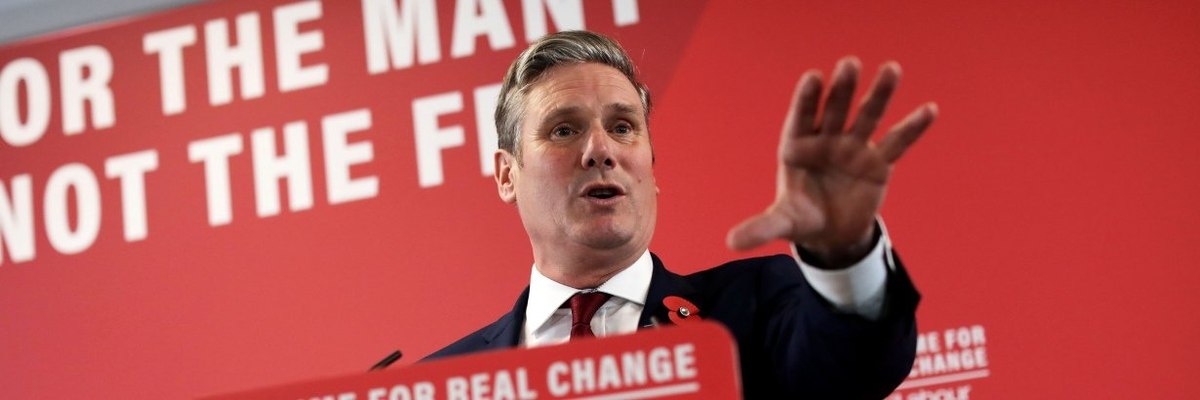Ahead of their party conference this weekend, Labour are in a much better place electorally now than they have been for much of the year. The latest YouGov vote intention polling for the Times found Labour on 35%, 4 points behind the Conservatives on 39%. Last week, we found a 2-point Labour lead.
But what progress have Labour really made with voters since 2019, and to what extent are they advancing now in key political battleground areas up and down the country?
According to new YouGov data collected on 10,000 respondents from 6-18 September, Labour are currently holding on to around two thirds (65%) of those who voted for them in 2019. Almost one in five (19%) would vote for a different party if an election were held tomorrow, while 15% do not know and 2% would not vote.
Of those 2019 Labour voters who gave us a party vote intention (i.e. excluding those who will not vote or are currently unsure), 78% said they would stick with Labour. At this point 11% would vote Green instead, 4% would now vote Conservative, and another 4% would vote Liberal Democrat. A mere 1% would switch to Reform UK. This suggests that Labour face their biggest thread from the left – specifically the Greens – when it comes to shoring up their voter base from the last election.
And what of 2019 voters who did not back Labour? What progress have Labour made winning over voters who did not support them under Corbyn at the last election? According to YouGov data, of those who did vote in 2019 but did not support Labour, 7% of them now would vote for Starmer’s party if an election were held tomorrow. Almost three-quarters (70%) would remain voting for other parties, 20% do not know, and 3% would not vote.
While 7% is a notable number, it does not suggest that Labour is doing a strong enough job of making serious inroads with voters who did not back them in their worst electoral defeat since before the second world war. Combined with the leakage of voters on the party’s left flank, the situation is not one which Labour can be altogether comfortable with.
The vote in the Blue Wall
A YouGov survey carried out in July this year found the Conservatives struggling in their ‘Blue Wall’ heartlands, with Labour poised to take seven constituencies from them if an election were held the next day. Now, a fresh poll of 800 Blue Wall residents shows that Labour have made further advances since July, bringing more Conservative MPs into electoral danger.
According to our data, Conservative vote intention in the Blue Wall is currently 45%, up just one point on our July figures. That represents a seven-point drop on the 2019 general election result. Labour, however, have risen to 26% - up six points on 2019 and a further two points on their position earlier in the summer. Labour’s gains have seemingly come at the expense of the Liberal Democrats, who have dropped from 24% in 2019 and 18% in July to just 15% of the vote now. The Greens have also risen to 11%, while the vote for other parties stands at 4%.
This swing from the Conservatives to Labour puts yet more Blue Wall seats into the red column, with Milton Keynes North, Cities of London and Westminster, and Filton and Bradley Stoke joining the likes of Wycombe, Chipping Barnet, and Chingford and Woodford Green in changing hands from our July poll.
Despite party leader Ed Davey outlining their ‘Blue Wall’ target strategy again at their conference last weekend, the further drop in the Liberal Democrat’s vote puts Cambridgeshire South, Dominic Raab’s seat of Esher and Walton, and Lewes back over the line into Conservative hands. Meanwhile, other Lib Dem Blue Wall targets such as Guildford, Hitchin and Harpenden, and Wokingham move back further away from the orange horizon and into blue safety.
The vote in the Red Wall
After suffering the ignominious loss of over 50 constituencies across their Northern and Midlands ‘Red Wall’ at the 2019 general election, and dozens of council seats in the 2021 local elections, our latest Red Wall polling suggests the gap between Labour and the Conservatives in their former heartlands is now beginning to close.
Analysis of YouGov respondents living in constituencies across the North, Midlands, and Wales which were held by Labour before 2019 but now have Conservative MPs shows that Labour remain on 38% of current vote intention – identical to the share they received in 2019. The Conservatives, however, are down by four points to 44% of current vote intention. The Liberal Democrats are down by one point, the Greens are up five, while Reform UK gather the same vote share as the Brexit Party achieved in 2019.
With so many Red Wall seats in marginal territory after the ‘Blue Wave’ swept over them two years ago, just that two-point swing to Labour is enough to take 17 constituencies back into their hands. These include the Midlands seats of Birmingham Northfield, Gedling, and Stoke-on-Trent Central, the Welsh constituencies of Delyn and Clwyd South, and Blyth Valley, Burnley, and both Bury seats in the North. Other seats such as Wolverhampton South West, Leigh, Keighley, Hyndburn, and Wrexham would be left very close.
Looking further back to 2017, when Labour held on to vast majority of the Northern, Midlands, and Welsh Leave-voting seats targeted by Theresa May’s Conservatives in the summer snap election, and the scale of Labour’s recovery task becomes even more clear.
Labour’s current figure of 38% is a full 12 points back on their 2017 result of 50% in the Red Wall constituencies. And, despite being down on 2019, the Conservatives are still two points up on their showing from that election (42%), highlighting the strength of their gains and momentum built up in these key political areas.
Labour have clear work to do
Despite these advances, Labour will be disappointed at still being behind in the majority of Red Wall seats, and the number of Blue Wall seats in which the party may currently be ahead is nowhere near enough to address the balance.
So, even with the vote intention gap between the Conservatives and Labour narrowing since earlier in the year, and since 2019, Boris Johnson’s majority would not appear to be under severe threat should an election be held any time soon.
See full results here







